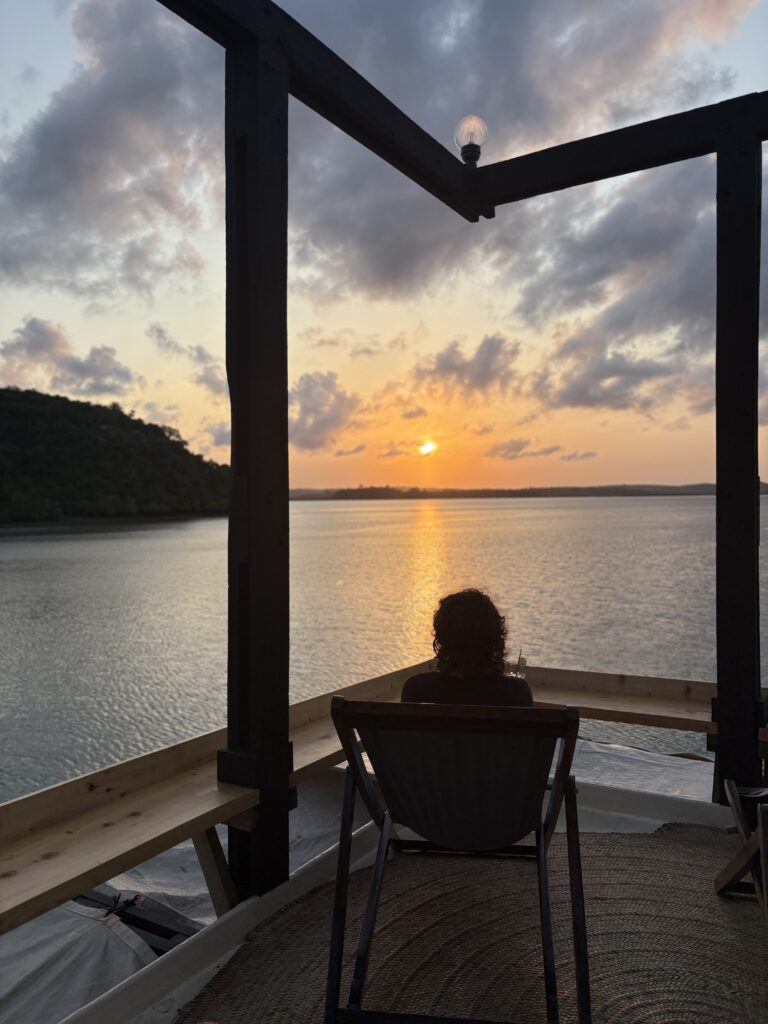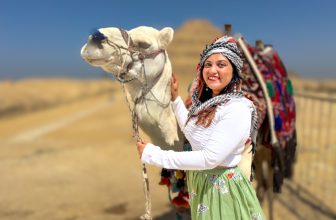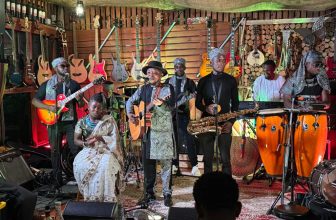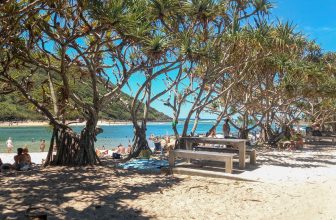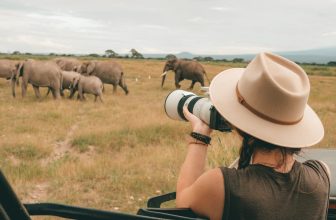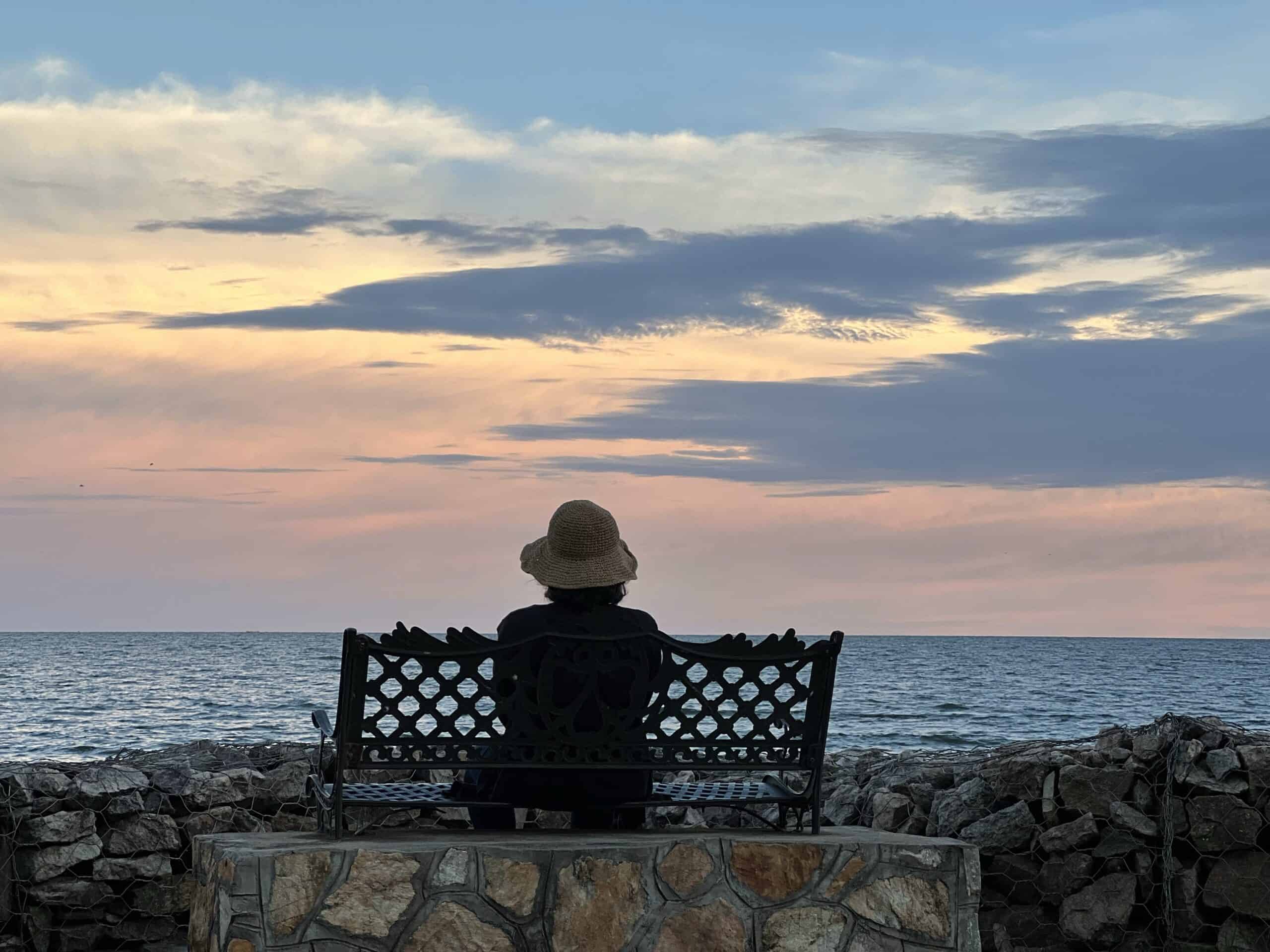
On a breezy afternoon, I sat at a rooftop cafe in Kigali, writing with a glass of regionally-grown iced chocolate. From the tall glass windows, I watched the rain fall gently on the tiled roofs, the avocado trees and the hills beyond. My partner and I had arrived in Rwanda only a week ago, but I already felt like I was part of the country’s fabric. We had serendipitously met Kigali’s zero waste entrepreneurs, hiked in the city’s urban wetlands, attended a moving music gig that paid tribute to the lives lost to the brutal genocide of 1994, and indulged in delicious vegan-friendly Rwandan food.
We spent a whole month in Kigali, unable to tear ourselves away from what is likely one of the world’s coolest capital cities. Then we crossed the land border into the wilderness of Uganda, to track gorillas on foot, witness the ferocity of the River Nile and self-drive into its oldest national park. Finally and hesitantly, we boarded a 16-hour bus – known for kidnappings and other scary episodes – to Kenya, where we spent a surreal month living among ancient Baobabs by the Indian Ocean.
Also read: 6 Months, 6 Countries: Epic Memories from Central America
It hasn’t been long since those adventures (I’ve spent a month each in Bali and Mumbai since), but amid new personal pursuits, work projects and the turmoil of the world, my memories are already starting to feel blurry. So here I am, remembering those moments of awe, joy, fear, inspiration and connection – and sending you a sign to follow in my footsteps:
Tracking endangered gorillas on foot in Bwindi National Park
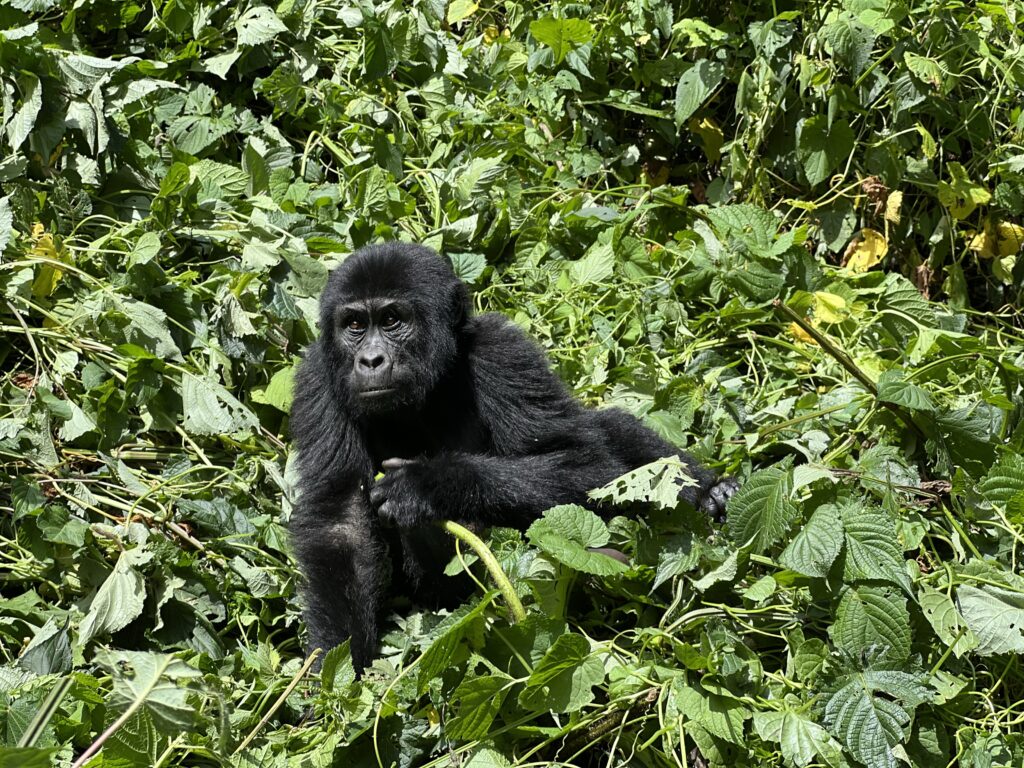

ONLY 1063 mountain gorillas remain in the wild, and we were lucky enough to spot a family of 14 in the dense Bwindi Impenetrable Forest in Uganda with Mission Africa Safaris! But this is more just a walking wildlife safari. It’s the story of what’s possible when conservation meets responsible tourism. Poachers have been retrained as trackers, and even though the forest is full of gold, no mining – legal or illegal – happens because of the tourism revenue it draws.
Sadly though, the forest-dwelling Batwa community was evicted from the forest as part of the ‘fortress conservation’ model, and their culture has been turned into a performative act for tourism. Indeed, this is a story that highlights not just the successes but also the pitfalls of wildlife tourism.
Also read: Stories From The Wild in Madhya Pradesh
Walking across the border from Uganda to Kenya at midnight
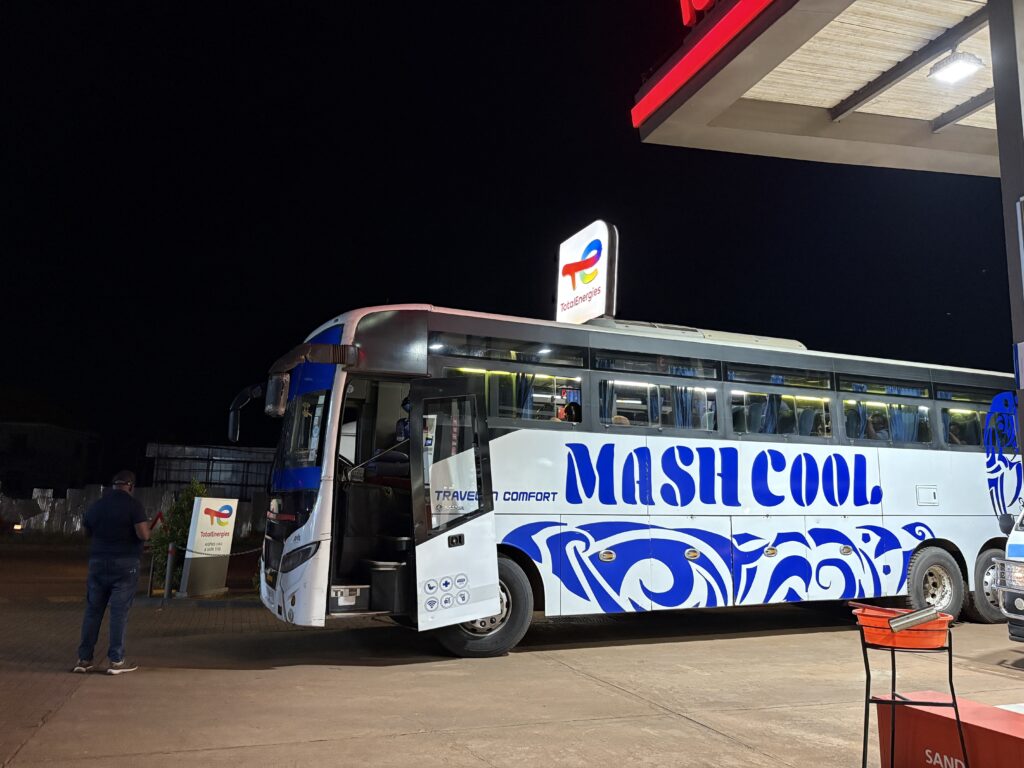

As part of our overland journey through East Africa, we undertook a grueling 16-hour bus journey from Kampala to Nairobi. Though pretty expensive, the bus turned out to be rather basic – rustic, cramped, no cushioned seats, no AC. Along the way, our bags and bus were checked by the police and military officials multiple times, for this route is notorious for kidnappings, druggings and robberies.
Just after midnight, the bus stopped in the last obscure town before the border. Under the moonlit sky, we walked across no man’s land – out of Uganda and into Kenya. After being stamped into Kenya, I vividly remember breathing in the chilly night air as we waited for the bus to find us on the other side of the border. As smoky air blew out of my lips, I felt exhilarated; it’s not everyday that you get to walk across these imaginary lines!
Also read: How We *Almost* Got Stranded at the South Africa – Lesotho Border
Car-free Sundays in Kigali with my Rwandan hostess
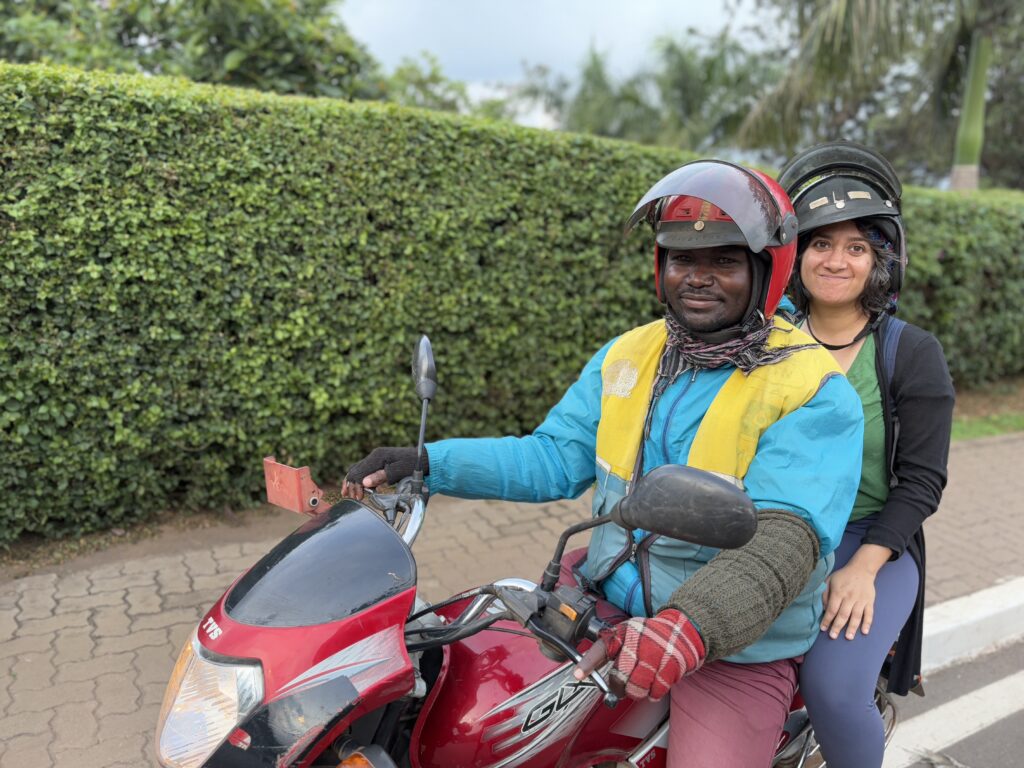

On two Sundays every month, the City of Kigali closes some streets to motorized traffic until noon, turning large parts of the city into walking, jogging, cycling and sports areas! I joined my sweet Rwandan hostess for a long morning walk on one such Sunday, and was delighted to see people out in large numbers to make the most of the morning. Over an hour or so of walking along the tree-lined streets and pretty blue sky, we exchanged stories about our lives, similarities between Rwanda and India, and the colonial policies each of our countries is still bearing the brunt of…
Kigali also designated ‘car-free zones’ in some neighborhoods to enable social distancing during Covid, and decided to keep them that way when things reopened. I wish more cities around the world, especially in India, create traffic-free zones or days – for it can reduce carbon emissions, create opportunities for outdoor recreation, and significantly impact the mental health of residents!
Also read: What Indian Cities Can Learn About Green Tourism from Copenhagen
Slowing down with a high-altitude lake community in Uganda
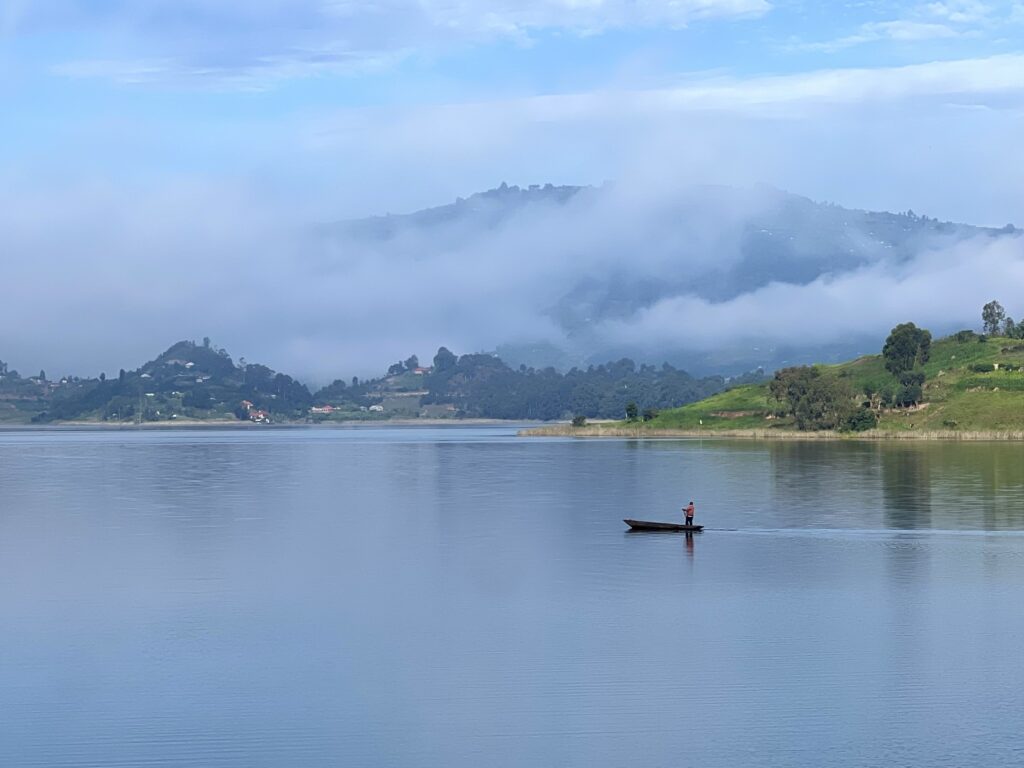

In the highlands of Uganda, we spent a week living in a solar-powered dome on the shores of Lake Bunyonyi, one of Africa’s highest, largest and deepest lakes! Our slow days were marked by swimming in the cool lake waters, taking the canoe to the islands and school dotting the lake, hearing awe-inspiring stories of the times that the lake was a remote leprosy settlement, and sleeping under thousands of stars.
Unfortunately, not many lakes in East Africa are swimmable. We went kayaking on the vast Lake Muhazi in Rwanda, but later found out that the lake water contains the parasite Bilharzia. It can enter the skin even through exposure to a few drops of water, manifest in the body for months, show up in the form of itchy rashes and lead to chronic ailments. I almost bought myself a coffin when I googled what it does😉
Also read: Lessons on the Art of Living in Sri Lanka’s Hill Country
Learning about the practice of ‘umuganda’ in Rwanda
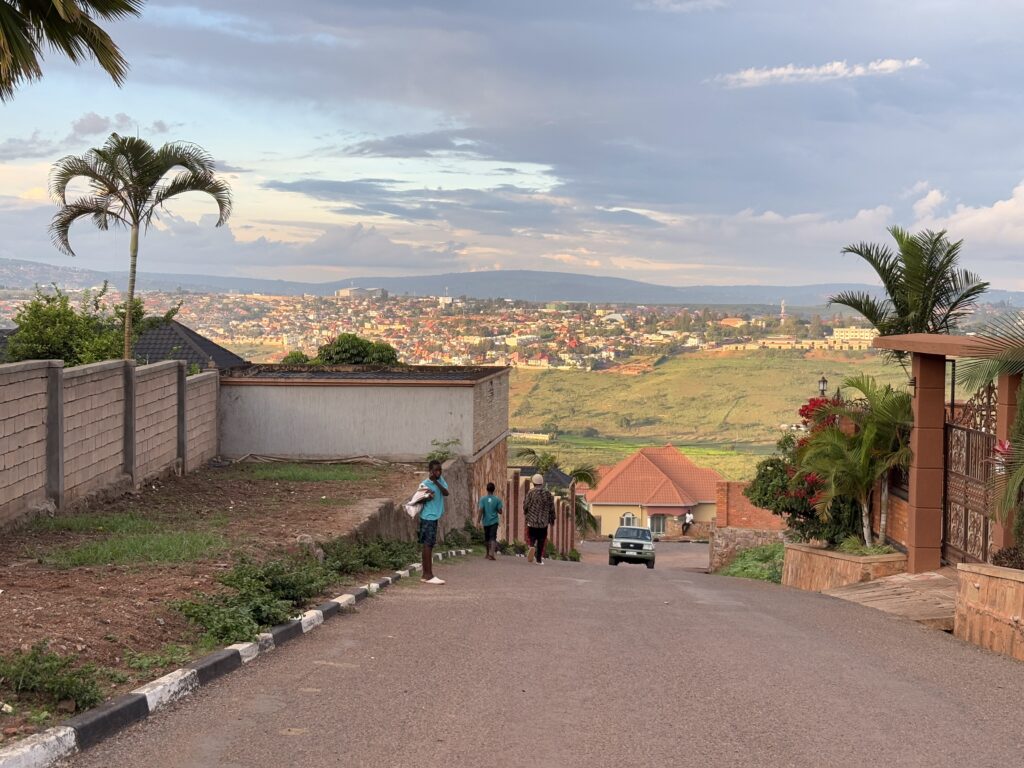

Just before the last Saturday of the month, I was surprised to hear of cafes opening late and daily tours being delayed, so everyone could participate in the Rwandan practice of umuganda. This is no ordinary tradition or practice. Before noon on the last Saturday of each month, Rwandans gather within their neighborhoods across the country to participate in community service – mending roads, planting trees, cleaning the trash, fixing sidewalks!
I learnt from local friends that the practice began as the country was rebuilding itself after the genocide, as a way for citizens to become active members of their neighborhoods. Ahead of umuganda, the neighborhood council meets to determine the most urgent needs of the community, gathers the funds through citizen contribution, and implements it during umuganda. What a beautiful way to take ownership of your own country!
Also read: Get Busy Living or Get Busy Dying
Sunsets from a solar-powered floating bar in the Indian Ocean
I need to write a detailed post about the incredible month we spent in coastal Kenya – learning to sail, catching sunsets on the dhow, hanging out among ancient Baobabs, nightly excursions in search of bioluminescence – experiencing a whole world beyond that of wildlife safaris. One of my fondest memories is chilling at a solar-powered floating bar in the middle of the Indian Ocean! We watched glorious sunsets from the deck, jumped into the ocean, swam laps around the bar, and felt like time had acquired a different dimension.
Also read: Epic Yet Unusual Things to do in Cape Town
Experiencing Kigali with a Rwandan Women’s collective
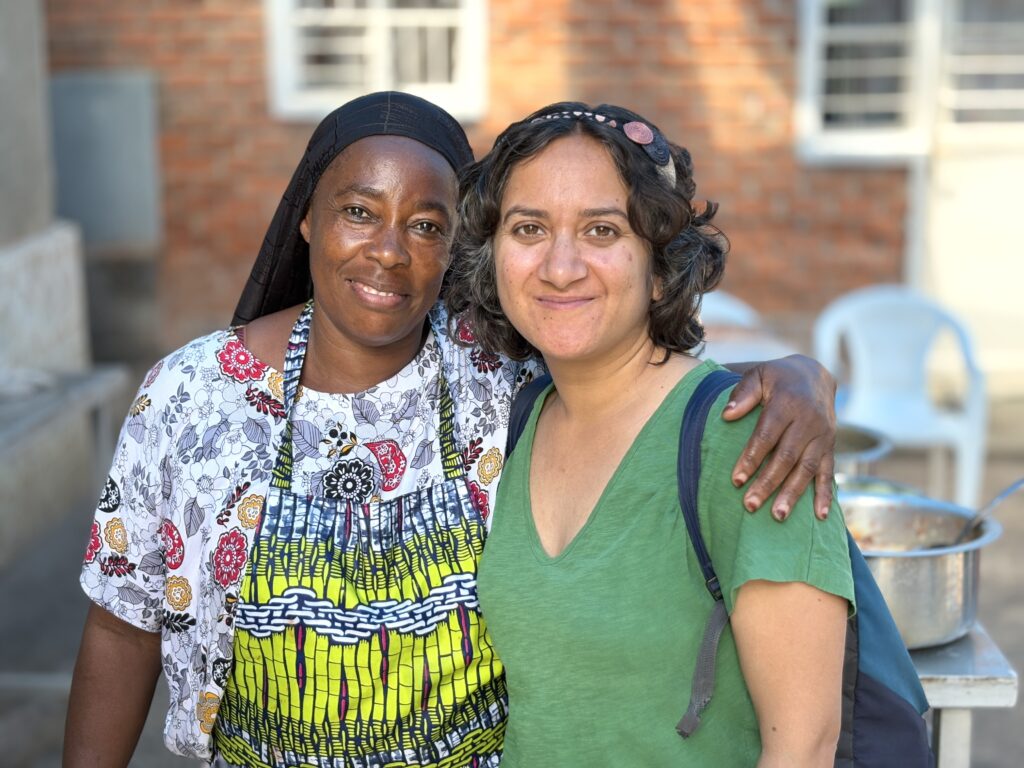

One of my most memorable experiences in Kigali was experiencing the city with the incredible Nyamirambo Women’s Centre, started by 18 women – mostly single moms – figuring out how to build a sustainable income and support others like them. Their walking tour, led by a female guide, gave us an insider glimpse of Nyamirambo, Kigali’s oldest neighborhood, with car-free zones, “milky bars,” little shops that sell homeground paste to make isombe (local spinach stew). We rounded off the afternoon with a delicious, accidentally-vegan meal in a local home.
Through community tourism, the Nyamirambo Women’s Centre now have a dependable source of livelihood, and they use the tourism profits to offer courses for local women in reading and writing, handicrafts and entrepreneurship. They’re now setting up a “Women’s Incubation Centre” – a hub of entrepreneurship for Rwandan women from challenging socio-economic backgrounds; if you can contribute to this important work, please do!
Also see: Everything You Need to Know About Community Tourism
Witnessing the River Nile at its most powerful in Uganda
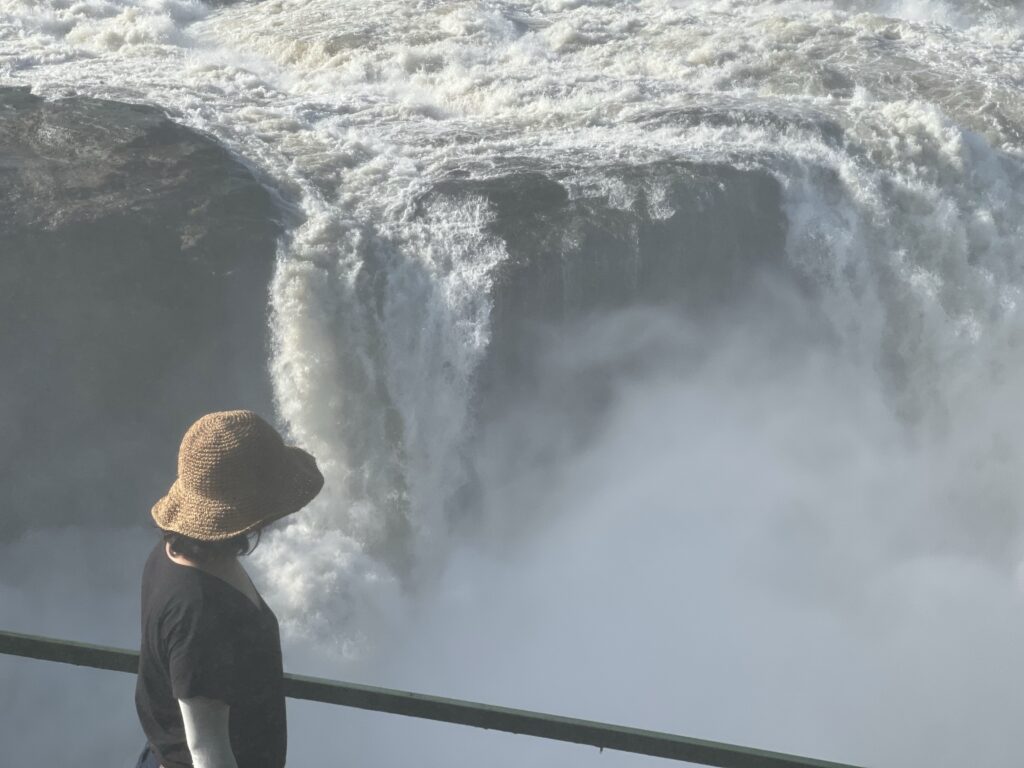

In a world where most rivers have been dammed, and their fury and flow reduced to a placid existence, I was filled with wonder and astonishment at witnessing the River Nile in all its glory. A short hike in Uganda’s largest and oldest national park – Murchison Falls National Park – led us to the place where the Nile flows with great gusto, falls off a cliff, plays with the sunlight to create rainbows, squeezes through a gorge, and forms the magnificent Murchison Falls. What a spectacle, and a reminder of why we need to preserve our planet’s wild, untamed beauty!
In the buffer zone of Murchison Falls National Park, we were lucky enough to stay at the stunning Murchison River Lodge – an eco-lodge built with natural materials, with no fences with the forest. Over breakfast, we saw hippos swim past, and at night, we heard them chomp on the grass under our cottage! I also loved learning about the impact of the lodge beyond its boundaries. They commissioned an upcycled playground for children in the heart of the village, and offer English classes and apprenticeship programs within the community.
Also read: 10 Incredible Eco Lodges Around the World: Indulge Yourself and Spare the Planet
Snorkeling in a community-led Marine Protected Area on the Kenyan coast
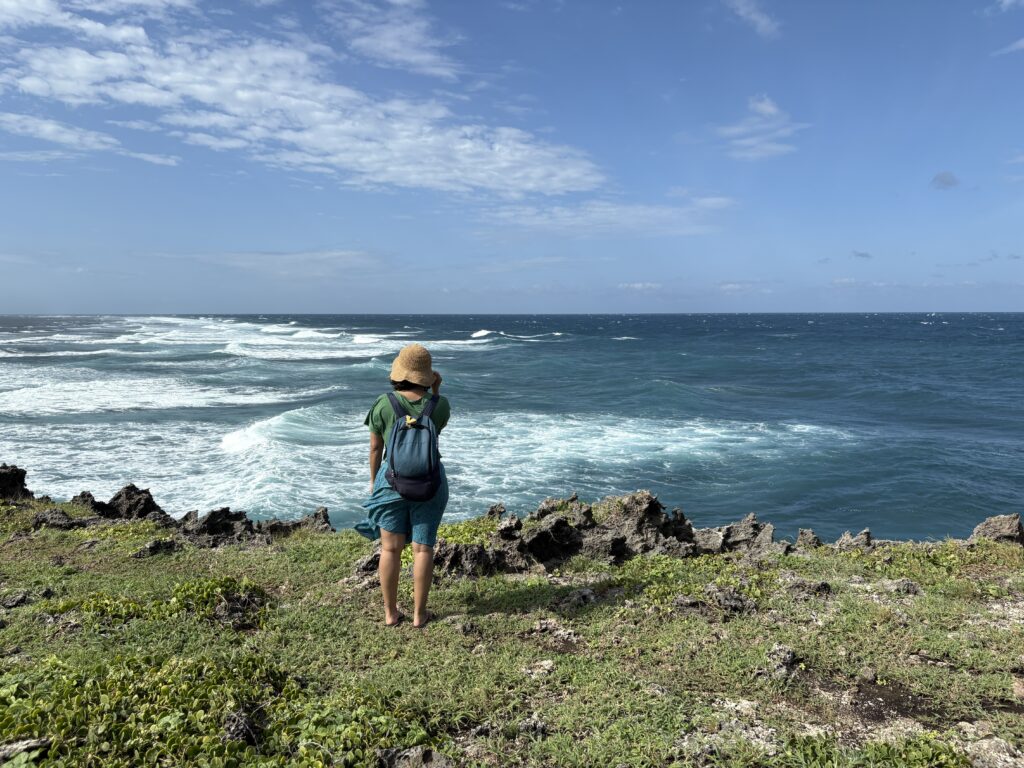

When a local recommended snorkeling in Kuruwitu, not far from Watamu, we landed up there expecting a nice morning of snorkeling. But it turned out to be one of the most inspiring stories I came across in Kenya. A couple of decades ago, the fisheries in Kuruwitu had become completely devoid of fish – due to both overfishing and the growing impacts of climate change. The local fishing community came together to brainstorm solutions, and decided to create a ‘no take zone’ spanning 30 hectares. This was back in 2003.
We waded through the ocean at low tide, following Jon – our guide and one of the founding members of the initiative, and were delighted to snorkel in the Marine Protected Area (MPA), full of colorful living coral and tons of fish! The community has since partnered with Kenya’s Wildlife Conservation Society for coral reef restoration, evidence of which we saw underwater in the form artificial structures populated by coral and fish. An inspiring example of grassroots climate action!
Also read: Mauritius is Not Just About The Seas You Sail, But Also the People You Meet Ashore
Witnessing the power of ‘kwibuka’ in Rwanda
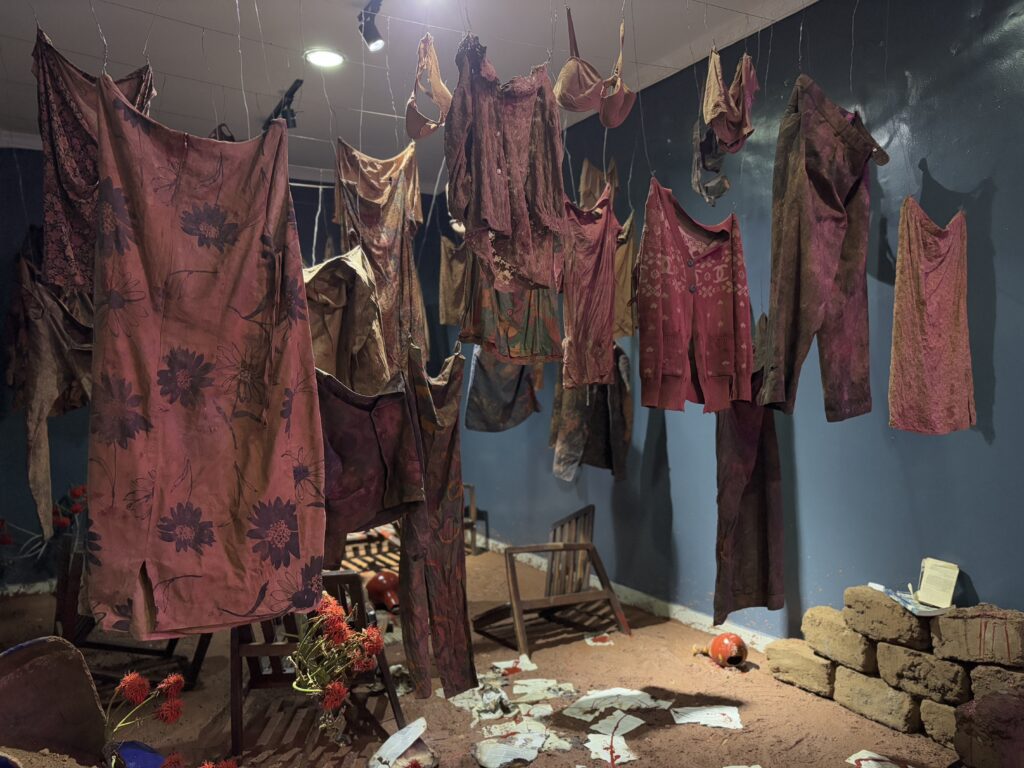

I had no idea that our time in Rwanda was going to coincide with the 31st kwibuka – the 31st year of remembrance of the Genocide against the Tutsi. Over a million people were brutally killed by friends and neighbors during 100 days of the genocide in Rwanda in 1994, scars of which are visible across Kigali today.
I had been cautioned online to avoid bringing up the subject with locals, but because it was the kwibuka week, we became part of events, movie screenings and music gigs that openly spoke of the pain and healing, and reconciliation work in Rwanda. It moved me in ways I couldn’t have anticipated, especially as I drew parallels with current day events – and what it will take for the world to heal again.
From my newsletter: What’s More Important: Forgiveness or Justice?
Have you been to Rwanda, Uganda or Kenya – or are they on your radar? Where would you like to slow travel?
*We were lucky to be hosted on some of these experiences, but as you know, opinions on this blog are always mine!
Hi there! I’m Shivya, and I started this travel blog back in 2011, when travel wasn’t trendy, Instagram didn’t exist and AI wasn’t a thing (simpler times, I know!). I write about slow, meaningful and conscious travel – that is good for us, the places we visit, the people we meet along the way, and the planet at large. Settle down, grab a cup of tea, and read stories that remind you of the essence of travel. I’m so glad you found me!

